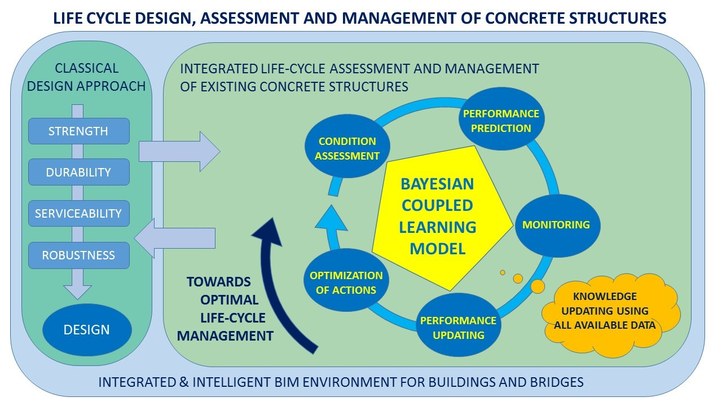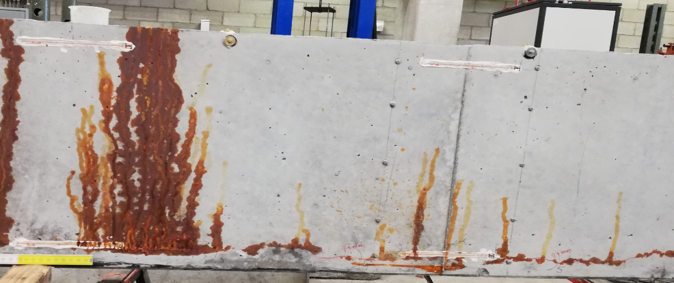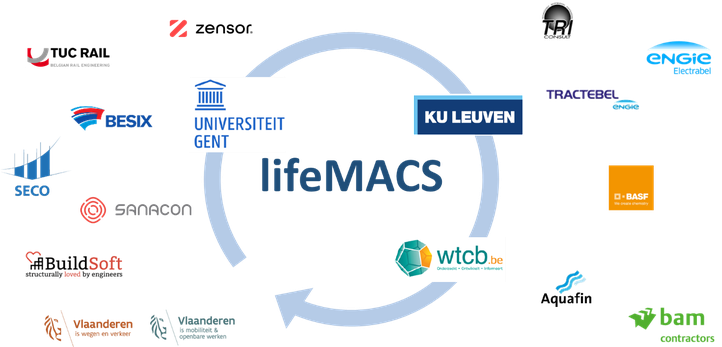Multi-layer Bayesian life-cycle methodology for the structural assessment of existing concrete structures (lifeMACS)
Researchers:
- Stef Helderweirt
- Karel Van Den Hende
- Wouter Botte (project manager)
- Robby Caspeele (supervisor)
Description:
Repair and upgrading of structures are becoming increasingly important and are associated to an increasing part of activities in the construction sector. Current state of the art lacks a coupled Bayesian framework that enables to update through-life performance predictions, optimize inspections and interventions and fully exploit knowledge available through information gathered or modelled, limiting the exploitation of the benefits of applying a life-cycle framework. The project is unique in developing a multi-layer Bayesian approach that enables to perform a coherent through-life performance quantification, life-cycle management and decision making for existing concrete structures taking into account all available information from inspections, monitoring and structural modelling. The fundamental research is related to: - Bayesian updated modelling of degradation and damage progress with a focus on parameter updating using destructive and NDT measurements, enabling to optimize inspection-based assessment schemes. - A multifunctional beam and plate FE model for the performance prediction and the optimization of inspections and interventions, enabling to incorporate time-dependent degradation effects, spatial variability and updated information based on investigations. - A probabilistic framework for the assessment and optimization of combined inspection and monitoring strategies considering uncertainties, exploiting information from spatial degradation and performance modelling. - A methodology for multi-objective performance-based optimization of maintenance strategies and repair or strengthening interventions in relation to the specified safety level, durability objectives and budgetary constraints. - A novel integrated BIM-environment for life-cycle management, structuring and integrating all relevant information from inspections, performance simulations and optimization processes, based on linked-data and a conceptual framework for a digital twin approach. These fundamental challenges need to be addressed in a multidisciplinary research context in order to arrive at an integrated assessment, repair and management of existing structures; and the required basic research surpasses the innovation capacity of the individual stakeholders. Therefore, the lifeMACS consortium has been formed with the needed critical mass in industry partners participating in the advisory board and research expertise from complementary organizations (UGent, KU Leuven and WTCB). Robby Caspeele is the main supervisor, while the co-supervisors are Stijn Matthys, Hans De Backer and Wouter Botte (UGent); Geert Lombaert and Els Verstrynge (KU Leuven) and Noël Huybrechts, Niki Cauberg and Petra Van Itterbeeck (WTCB). The results of the proposed project will enable the construction industry to create further ground-breaking industrial developments. Moreover it will support economic value creation, over the whole of the value chain, in the management, repair and safe extension of the service life of infrastructure and the building stock.
Partners:
Funding:
This project has received funding form the FWO through the Strategic Basic Research (SBO) program grant S001021N.



